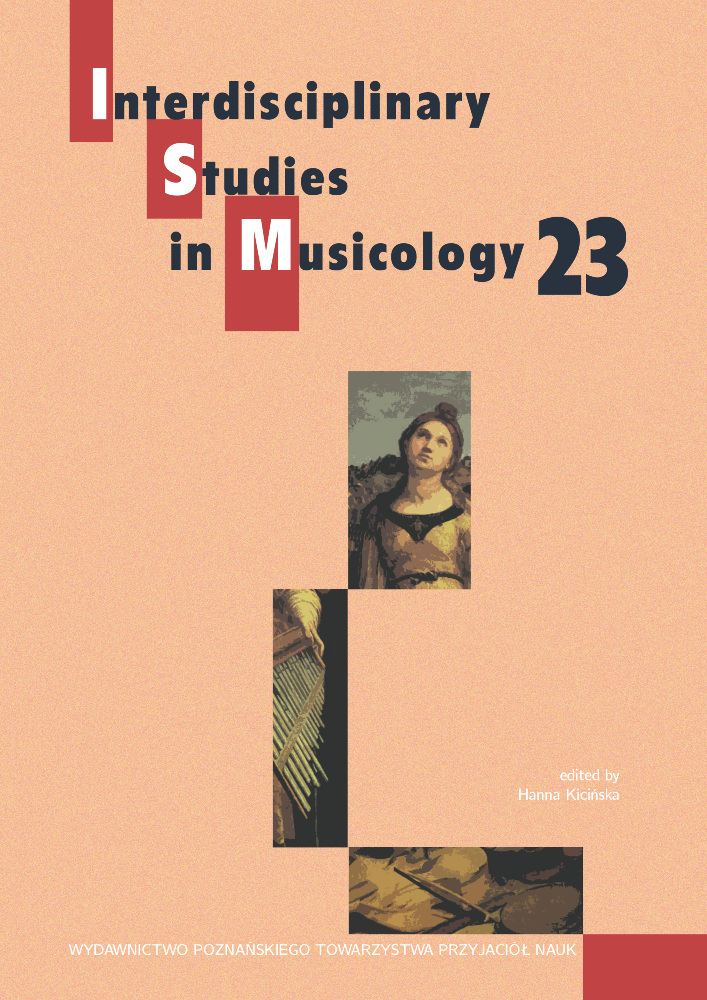Abstrakt
The article is devoted to the analysis of vocal works by Polish composers of the Romantic period. The article reveals the closeness of ethical and aesthetic beliefs of Stanisław Moniuszko and Kazimierz Lubomirski. It has been found that the musical education in the German tradition received by the natives of the regions of the cultural borderland gave them an impetus to serve Polish culture. In the works of both authors, there is an image of a star, which they interpret in a romantic dimension. The song ‘Little Star’ by S. Moniuszko and the song ‘Star’ by K. Lubomirski bear the imprint of Polish musical folklore. The use of elements of the national musical vocabulary clearly shows the composers’ national identity.
Bibliografia
Drucka, N. (1966). Stanisław Moniuszko: życie i twórczość [Stanisław Moniuszko: his life and work]. Warszawa: Nasza Księgarnia.
Elsner, J. (1957). Sumariusz moich utworów muzycznych z objaśnieniami o czynnościach i działaniach moich jako artysty muzycznego [Summary of my musical works with explanations of my functions and activities as a musical artist]. Kraków: PWM.
Kaczyński, T. (1961). Miejsce Moniuszki [Moniuszko’s place]. Ruch Muzyczny, 6: 9.
Kluczniok, M. (2016). Dziewiętnastowieczne zbiory pieśni i piosenek dla dzieci i młodzieży [Nineteenth-century collections of songs and ditties for children and youngsters]. Nowa Biblioteka. Usługi, Technologie Informacyjne i Media, 23: 43–64.
Liszt. (2010). Chopin (M. Hughes, Transl. & Ed.). Manchester: Manchester University Press.
Lubomirski, K. (1916). O Gwiazdeczko! [O little star]. In L. Chojecki (Ed.). Pieśni nasze [Our songs], (pp. 2–3). Warszawa: B. Rudzki.
Lubomirski, K. (c. 1855). Gwiazdka [Star], Op. 22 Warszawa: Friedlein.
Marcinkiewicz, W. (n.d.). [poem]. Belarusian State Archive-Museum of Literature and Art, 66/1/1322, f. 1–2.
Mickiewicz, A. (2018). Pan Tadeusz (B. Johnston, Transl.). Brooklyn, NY: Archipelago.
Moniuszko, S. (1908). Dziewiąty śpiewnik domowy [Ninth home songbook]. Warszawa: Gebethner i Wolf.
Moniuszko, S. (1969). Listy zebrane [Collected letters]. Kraków: PWM.
Ród Lubomirskich w muzyce [The Lubomirski family in music]. (1899). n/a. Echo Muzyczne, Teatralne i Artystyczne, 13: 146.
Soltanovskyi, A. (2014) ‘Оtryvky iz zapisok’ [Excerpts from notes]. In Rivnenska himnaziia: 1839–1921. Istoriia. Spohady. Dokumenty [Rivne Gymnasium 1839–1921: history, souvenirs, documents]. Rivne: Diatlyk M.
Sułek, M. (2011). Zarys biografii oraz charakterystyka twórcyości wokalnej księcia Kazimierza Lubomirskego na przykladzie pieśni do słów Adama Mickiewicza [Biographical outline and profile of the vocal compositions of Prince Kazimierz Lubomirski, based on the example of his songs to words by Adam Mickiewicz]. In M. Woźna Stankiewicz & A. Sitarz (Eds.). Muzyka jest zawsze współczesna [Music is always contemporary], (pp. 613-631). Kraków: Muzyka Iagellonica.
Sułek, M. (2016). Stanislaw Moniuszko i inni kompozytorzy wobec poezij Adama Mickiewicza. Studium komparatystyczne [Stanisław Moniuszko and other composers with regard to the verse of Adam Mickiewicz: a comparative study]. Kraków: Musica Iagellonica.
Topolska, A. (2014). Mit Stanislawa Moniuszki jako wieszcza narodowego [The myth of Stanisław Moniuszko as a national bard]. Poznań: PTPN.
Wołoszyn, M. (2017). Historia Ordynacji Przeworskiej Książąt Lubomirskich [History of the Princes Lubomirskis’ Przeworsk entail estate]. Rzeszów: Edytorial.
Licencja
Prawa autorskie (c) 2023 Tetiana Prokopovych

Utwór dostępny jest na licencji Creative Commons Uznanie autorstwa – Bez utworów zależnych 4.0 Międzynarodowe.

